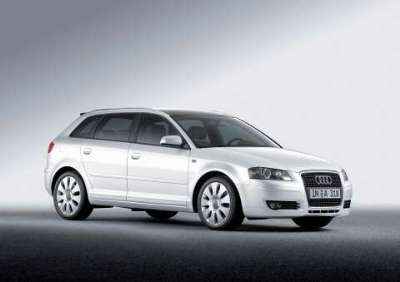|
| ||||
|
Audi Introduces First ‘E’ Model To Australia
18th October, 2007 | |||
|
Audi Australia has unveiled its first ‘e’ model locally. The new A3 Sportback 1.9 e is the latest generation of highly fuel efficient vehicles from Audi, developed as a result of the brand’s desire to achieve maximum efficiency for everyday driving situations. Following its debut in Sydney last Thursday, the Audi A3 Sportback 1.9 TDI e will take part in the 2007 Panasonic Solar Challenge ‘Greenfleet’ fuel economy class, driving from Darwin to Adelaide from 21st to 28th October, 2007. The new A3 Sportback ‘e’ model is now available for customer order in Australia. It is expected to be priced around $37,000 (RRP). According to Dr Peter Gebhard, Audi’s spokesman for Vehicle Physics and Fuel Consumption, the issue of fuel consumption has long been seen as a matter of elementary customer benefit at Audi and is therefore a focus of technical development. As a result, four new Audi e-models – A3, A3 Sportback and A4 saloon and Avant estate – have been rapidly developed to demonstrate how seriously the company takes the issue of reducing fuel consumption and saving resources and its commitment to providing workable solutions. Even with their special design, Audi’s ‘e’ models uncompromisingly satisfy customer expectations with respect to drivability, just like any other car made by Audi. The A3 1.9 TDI e generates 77 kW and a handy 250 Nm, and reduces CO2 emissions by 10 g/km or 8 percent compared to the basic version. With 119 g/km it even undercuts the much talked about limit of 120 g/km – and does so with an outstanding performance. In terms of customer-relevant CO2 emissions, the A3 1.9 TDI e is on a par with hybrid models, but in terms of dynamism it is far superior. It has longer transmission ratios for 3rd to 5th gears and incorporates a whole series of weight-reduction modifications, including vehicle aerodynamics. The alloy wheels, fitted as standard, are of 205/55 16 inch format with low rolling-resistance tyres. Even the engine electronics have been tuned for optimum fuel economy. According to Dr Gebhard, it is not enough to simply develop measures to reduce fuel consumption by looking at the engine. “The engine is only responsible for half the fuel consumption and only a fraction of this can be optimised. This makes it important for every single vehicle component to be examined for its potential to reduce consumption and be optimised wherever possible,” he said. “Different components have a different degree of influence on fuel consumption. Reducing the mass of the vehicle by 100 kilogrammes will save 0.3 litres/100 km. A 10 percent reduction in air resistance will improve fuel consumption by 0.15 litres/100 km.” “200 watts of mechanical power has the same effect as 100 watts of electrical power: 0.1 litres/100 km. Add to this the power steering pump with a power draw of 2 kW, the air conditioning, which requires 1 litre/100 km at an outside temperature of 35 degrees Celsius and the rolling resistance of the tyres. At 120 km/h this amounts to 2 litres/100 km. Taken together, all these factors are too great to be ignored,” he added. The Audi A3 Sportback 1.9 TDI e reaches a top speed of 194 km/h, yet has a spectacularly low fuel consumption of 4.5 l/100 km. It can drive for up to 1,200 km between refuelling stops. Intelligent technical details enable the driver to use fuel even more efficiently, including a gear shift indicator located in the instrument cluster, in the direct field of vision. Depending on current engine load and speed, it tells the driver whether the next gear would be a better choice. When it comes to fuel consumption, it is essential for the driver to make full use of the vehicle's potential – the new gear shift indicator provides an invaluable aid here. Ultimately it is the driver who is responsible for driving style, and therefore fuel consumption – despite all technical advances. Individual style can reduce fuel consumption and with it emissions, by up to 30 percent, without compromising on speed and dynamism. | ||||
ABN 47106248033 |
 |
All rights reserved. |
